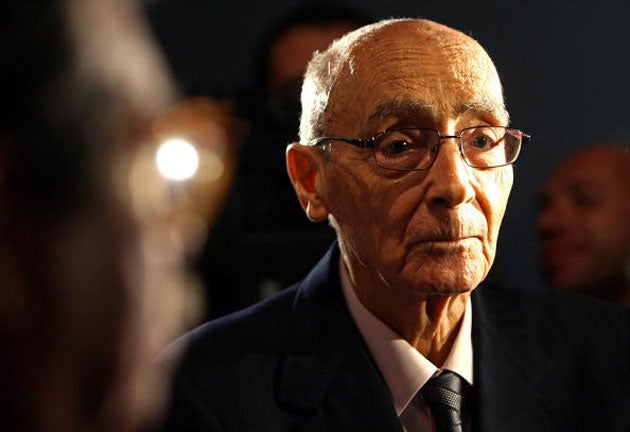Veteran Saramago reaches end of epic journey

Portugal's Nobel Literature laureate Jose Saramago has announced the completion of his latest work "The Elephant's Journey", based on the real-life epic journey of an Indian elephant named Solomon who travelled from Lisbon to Vienna in the 16th century.
Saramago's achievement marks a rebirth for the veteran writer, 86, whose flagging health, for which he received hospital treatment late last year, sounded alarm bells in the literary world.
The author describes the book as "a story rather than a novel". It will be published shortly in Spanish, Portuguese and Catalan, and opens with the line: "However incongruous it may seem..."
Saramago has been captivated by the tale for last ten years, ever since he made a visit to Austria and went to eat by chance in a Salzburg restaurant called The Elephant, the author says in a long email interview published recently in the Spanish press.
The Elephant's Journey is filled with characters, some of them real historical figures, others anonymous fictional creations: "they are people the members of this travelling caravan encounter on their journey, and with whom they share perplexities, efforts and the harmonious joy of a roof over their heads".
The tale begins with a real event, but the scarcity of historical details of what actually happened during that improbable pan-European odyssey forced the writer to exercise his imagination.
The work is a reflection on feelings of "compassionate solidarity," Saramago emails from his home in the Canary Island of Lanzarote. He confesses there were moments when he thought he'd never finish, as he had suffered for many months from a serious respiratory illness.
"This story, I prefer to call it that rather than a novel, is what I always thought it should be. My illness didn't change anything," Saramago says. None the less, "the years don't pass in vain. It wasn't a stroll in the park. Something of what I went through will have passed into my writing. But even so, the essential elements of the story didn't change."
He felt relieved and pleased to have been able to finish the work, he added. "I wrote my last three books in the most deplorable state of health, not at all favourable for happy feelings. I prefer to say: if you have to write, you will write."
The tale is filled with the irony, sarcasm and humour typical of Saramago, his Spanish wife and translator, Pilar del Rio, writes on the author's website. The work follows the rules that the author sets for all his books, she adds. "Dialogues alternate with narrative to form a whole, which the reader has to sort out according to his or her own rhythm.
Saramago always seeks an exchange with the reader," Ms del Rio says.
The prolific writer, the son of landless peasants from Portugal's impoverished south, is author of The Cave, The Siege of Lisbon, The Stone Raft, Blindness and A Year in the Death of Ricardo Reis, among many works translated into English. He abandoned his homeland to settle in Lanzarote in 1991 when the conservative government in Lisbon censored his book "the Gospel according to Jesus Christ," claiming it was offensive to Catholics. He was awarded the Nobel Literature Prize in 1998.
From his self-imposed exile on the Spanish island, the radical former communist continues to snipe at the political establishment. He infuriated his compatriots last year when he urged Portugal to join Spain as an autonomous province, to form a new country, "Iberia". The provocative proposal plunged each country into a frenzy of soul searching over tortured relations with its closest neighbour. "We would continue to speak Portuguese, and write, think and feel in our own language," he prophesied teasingly. "We wouldn't have to become Spaniards."
Now recovered in health, and with renewed energies, Saramago reflects on the relationship between the writer and illness. "Can literature save your life?" his cyber-interlocutor asks. "Not as a medicine, but it is one of the richest springs from which the spirit can drink," the Portuguese laureate replies. "Perhaps it can't do great things for the body, but the soul needs literature like the mouth needs bread."
Join our commenting forum
Join thought-provoking conversations, follow other Independent readers and see their replies
Comments
Bookmark popover
Removed from bookmarks